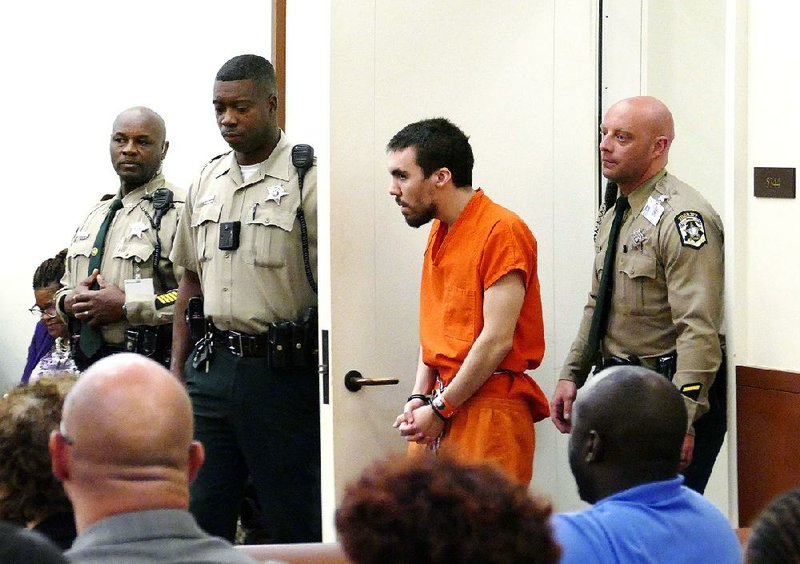In guilty plea, N.C. campus killer ‘sorry’
CHARLOTTE, N.C.— The man charged with killing two North Carolina university students and wounding four others in April pleaded guilty Thursday to two counts of first-degree murder and other charges, then apologized for his crimes.
Trystan Andrew Terrell also pleaded guilty Thursday to four counts of attempted murder and discharge of a firearm on educational property — charges filed in the April 30 shooting of students gathered in a lecture hall at the University of North Carolina at Charlotte.
“I am so sorry to everyone,” said Terrell, bending over to speak into a microphone. “If I could go back in time to that classroom, I would back out of it. I made a mistake.”
State prosecutors accepted Terrell’s plea during a hearing that was previously scheduled to decide whether the gunman could face the death penalty for the killings.
Investigators said in released documents that Terrell spent months planning the shooting at the school he formerly attended. He told investigators he gave up on the attack on the spring semester class’s last day after being tackled by one of the students who died, Riley Howell. Howell knocked the assailant down, buying enough time for the first officer into the classroom to capture Terrell, Charlotte-Mecklenburg Police Chief Kerr Putney said.
Vaping illnesses now at 530, U.S. says
NEW YORK — More than 500 people have been diagnosed with vaping-related breathing illnesses, but the cause remains unknown, U.S. health officials said Thursday. An eighth death also was reported.
The Centers for Disease Control and Prevention said 530 confirmed and probable cases have been reported in 38 states and one U.S. territory, up from 380 a week ago.
The eighth fatality was a man in his mid-40s who died this week in a St. Louis hospital, Missouri health officials said.
Canada reported its first case Wednesday, a high school student who was on life support and has since recovered.
All patients had used an electronic cigarette or other vaping device.
Doctors have said the illnesses resemble an inhalation injury, with the lungs apparently reacting to a caustic substance. So far, no single vaping product or ingredient has been linked to the illnesses, though most patients reported vaping THC, the high-producing ingredient in marijuana.
Two-thirds of the cases involved 18- to 34-year-olds. Three-quarters are men.
Some of the first cases appeared in April. The CDC hasn’t said when most people got sick.
Separately, the Food and Drug Administration revealed that its criminal investigations unit started tracking leads early on, as cases pointed to black-market vaping products.
U.S. expels 2 Cubans, restricts others
WASHINGTON — The U.S. is expelling two Cuban diplomats and is restricting travel of members of Cuba’s permanent mission to the United Nations days before world leaders gather for the annual U.N. General Assembly.
State Department spokesman Morgan Ortagus said the Cuban diplomats who are being expelled are attached to the U.N. mission.
Ortagus said in a statement that the diplomats tried to “conduct influence operations against the United States.” The diplomats’ names weren’t released.
All members of the Cuban mission are being restricted to the island of Manhattan.
Cuban Foreign Minister Bruno Rodriguez said the allegations were a “vulgar slander” against the two diplomats.
Relations between Cuba and the U.S. have deteriorated under President Donald Trump. His administration has restricted travel to the island and has imposed new economic sanctions.
Research set on pot’s pain-relief value
The U.S. government will spend $3 million to find out if marijuana can relieve pain, but none of the money will be used to study the part of the plant that gets people high.
Nine research grants announced Thursday are for work on CBD, the trendy ingredient showing up in cosmetics and foods, and hundreds of less familiar chemicals. THC research was excluded.
The federal government still considers marijuana an illegal drug, but more than 30 states allow its use for a range of medical problems, some without good evidence.
The science is strongest for chronic pain, the most common reason people give when they enroll in state-approved medical-marijuana programs. But little is known about which parts of marijuana are helpful and whether the intoxicating effects of THC can be avoided.
“The science is lagging behind the public use and interest. We’re doing our best to catch up here,” said Dr. David Shurtleff, deputy director of the National Center for Complementary and Integrative Health, which is funding the projects.
